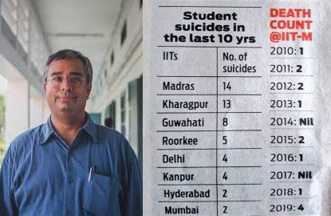
CORPORATE CITIZEN CLAPS FOR THE ‘CHARITABLE’ GESTURE SHOWN BY 16 ALUMNI OF THE BEL-AIR COLLEGE OF NURSING (PANCHGANI), IN ‘GIVING BACK’ TO THE VERY FOUNDATION THAT NURTURED THESE GIRLS IN THEIR COLLEGE YEARS
In its quest to ‘Educate, Empower and Liberate’ the girl child, the Lila Poonawalla Foundation (LPF) has come a long way since its inception in 1996 in its quest to give educational opportunity to meritorious, underprivileged girl students. Lila and Firoz Poonawalla, the dynamic and visionary couple behind this philanthropic mission, recently received a pleasant surprise. In a gesture of ‘giving back’, some of LPF’s girl scholars who pursued a nursing course at the Bel-Air College of Nursing surprised Lila and Firoz by donating Rs.3,00,000 to the foundation. These girls sprung the surprise at a special ceremony, held at Bel-Air home campus in Panchgani. The inspiration behind this ‘giving’ as a mark of gratitude is Father Tomy, who runs Bela-Air College and Hospital and instils the right values in his students.
While the girls’ noble act is to be lauded, equally laudable is LPF’s ‘social will’ whereby the foundation provides an outright grant of up to a maximum of Rs.1,00,000 annually, to chosen girl candidates for completing their school, under graduation (UG) and post-graduation (PG) education in their chosen fields for the entire period of their course, irrespective of the course duration whether it be a two-year or a four-year course. LPF annual scholarship programme has enabled 8000 deserving and underprivileged girls from rural areas to realise their potential and steer them closer to their dreams. “This year, we are planning to give scholarship to 1000 girls besides 320 schoolgirls. We received calls from girls who have availed our scholarships. Their life has changed. They are independent and have been able to protect themselves from early marriages,” said Lila Poonawalla.
CORPORATE CITIZEN SLAPS THE ESCALATION OF SUICIDES SEEN ACROSS ACADEMIC INSTITUTIONS IN THE COUNTRY INCLUDING THE PRESTIGIOUS CAMPUSES OF THE IITS

While it is estimated that about six students commit suicide each day, the statistics become even more alarming when elite engineering colleges too tread the same path. Reports revealed that 27 students across 10 IITs nationwide, committed suicide in the past five years. Students from IIT Bombay, Guwahati, Roorkee, Kanpur, Varanasi’s IIT (BHU), IIT (Indian School of Mines) Dhanbad reported suicidal deaths amongst elite engineering colleges during the period. The revelation was in reply to a ‘Right to Information (RTI)’ by activist Chandrashekhar Gaur on December 2, 2019 to the MHRD (Ministry of Human Resource Development). Between 2014 and 2019, seven students from IIT Madras, five from IIT-Kharagpur and three each from IIT-Delhi and IIT-Hyderabad had committed suicide. However, the query did not generate any satisfactory reply and the only response was, “Systems are in place in IITs to enquire and take action in all complaints received from students in IIT campuses, which includes Student Grievance Cell, Disciplinary Action Committee, Counselling Centres, etc.” But, Patna- based Anand Kumar, the founder of “Super 30”, which has been grooming meritorious students from poor and backward families to enter these prestigious engineering institutes expressed his concerns too. He said, “In the present situation, the nature of the selection process for the IITs needs to be changed. In this process, students with innovative skills who are able to withstand different pressures of life should be given preference.” He also suggested that special English classes should be offered to IIT students from non-English medium or vernacular schools. While a few such episodes have sprung into the limelight, there remains several buried and untold case files. While building individual ‘coping mechanisms’ in institutionalised environments, learning could be a challenge, especially with stringent benchmarks. Besides, academic or peer pressure or hailing from vernacular backgrounds might indirectly hamper learning patterns. This, in turn, reflects the fundamental of the ‘one size does not fit all’ belief.